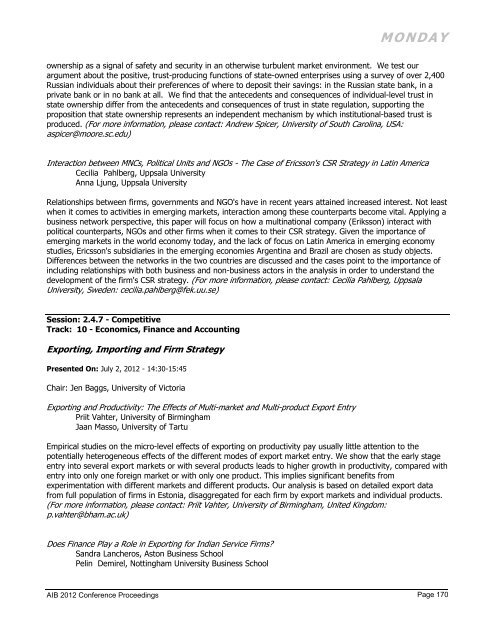AIB 2012 Conference Proceedings - Academy of International ...
AIB 2012 Conference Proceedings - Academy of International ...
AIB 2012 Conference Proceedings - Academy of International ...
Create successful ePaper yourself
Turn your PDF publications into a flip-book with our unique Google optimized e-Paper software.
MONDAY<br />
ownership as a signal <strong>of</strong> safety and security in an otherwise turbulent market environment. We test our<br />
argument about the positive, trust-producing functions <strong>of</strong> state-owned enterprises using a survey <strong>of</strong> over 2,400<br />
Russian individuals about their preferences <strong>of</strong> where to deposit their savings: in the Russian state bank, in a<br />
private bank or in no bank at all. We find that the antecedents and consequences <strong>of</strong> individual-level trust in<br />
state ownership differ from the antecedents and consequences <strong>of</strong> trust in state regulation, supporting the<br />
proposition that state ownership represents an independent mechanism by which institutional-based trust is<br />
produced. (For more information, please contact: Andrew Spicer, University <strong>of</strong> South Carolina, USA:<br />
aspicer@moore.sc.edu)<br />
Interaction between MNCs, Political Units and NGOs - The Case <strong>of</strong> Ericsson's CSR Strategy in Latin America<br />
Cecilia Pahlberg, Uppsala University<br />
Anna Ljung, Uppsala University<br />
Relationships between firms, governments and NGO's have in recent years attained increased interest. Not least<br />
when it comes to activities in emerging markets, interaction among these counterparts become vital. Applying a<br />
business network perspective, this paper will focus on how a multinational company (Eriksson) interact with<br />
political counterparts, NGOs and other firms when it comes to their CSR strategy. Given the importance <strong>of</strong><br />
emerging markets in the world economy today, and the lack <strong>of</strong> focus on Latin America in emerging economy<br />
studies, Ericsson's subsidiaries in the emerging economies Argentina and Brazil are chosen as study objects.<br />
Differences between the networks in the two countries are discussed and the cases point to the importance <strong>of</strong><br />
including relationships with both business and non-business actors in the analysis in order to understand the<br />
development <strong>of</strong> the firm's CSR strategy. (For more information, please contact: Cecilia Pahlberg, Uppsala<br />
University, Sweden: cecilia.pahlberg@fek.uu.se)<br />
Session: 2.4.7 - Competitive<br />
Track: 10 - Economics, Finance and Accounting<br />
Exporting, Importing and Firm Strategy<br />
Presented On: July 2, <strong>2012</strong> - 14:30-15:45<br />
Chair: Jen Baggs, University <strong>of</strong> Victoria<br />
Exporting and Productivity: The Effects <strong>of</strong> Multi-market and Multi-product Export Entry<br />
Priit Vahter, University <strong>of</strong> Birmingham<br />
Jaan Masso, University <strong>of</strong> Tartu<br />
Empirical studies on the micro-level effects <strong>of</strong> exporting on productivity pay usually little attention to the<br />
potentially heterogeneous effects <strong>of</strong> the different modes <strong>of</strong> export market entry. We show that the early stage<br />
entry into several export markets or with several products leads to higher growth in productivity, compared with<br />
entry into only one foreign market or with only one product. This implies significant benefits from<br />
experimentation with different markets and different products. Our analysis is based on detailed export data<br />
from full population <strong>of</strong> firms in Estonia, disaggregated for each firm by export markets and individual products.<br />
(For more information, please contact: Priit Vahter, University <strong>of</strong> Birmingham, United Kingdom:<br />
p.vahter@bham.ac.uk)<br />
Does Finance Play a Role in Exporting for Indian Service Firms<br />
Sandra Lancheros, Aston Business School<br />
Pelin Demirel, Nottingham University Business School<br />
<strong>AIB</strong> <strong>2012</strong> <strong>Conference</strong> <strong>Proceedings</strong><br />
Page 170

















